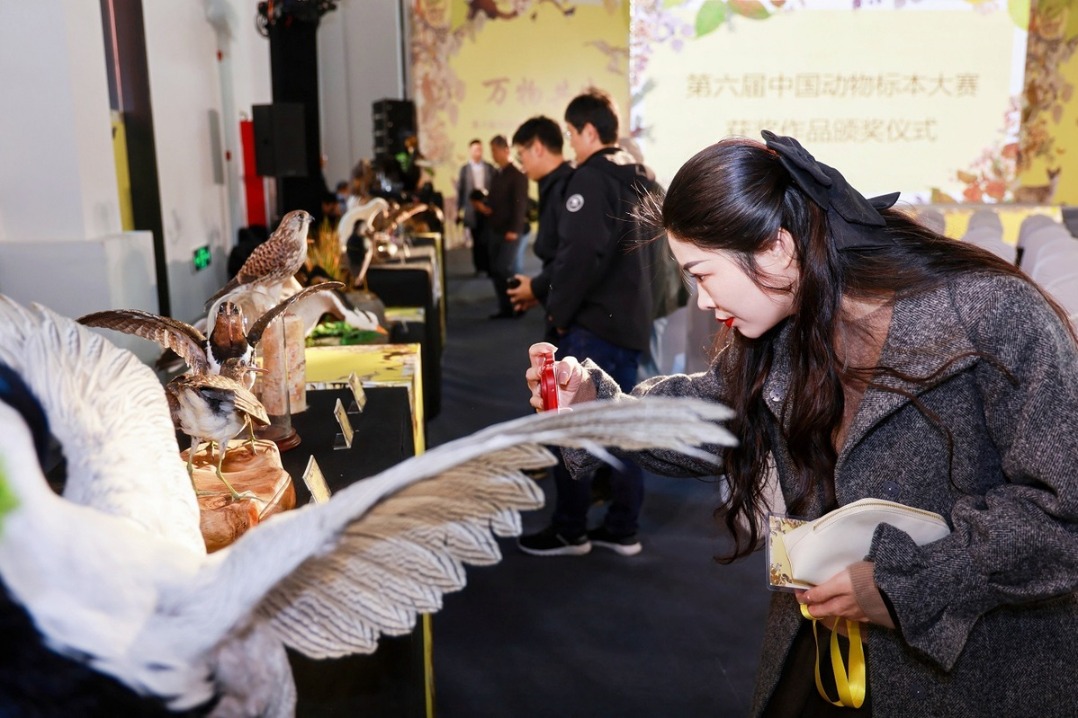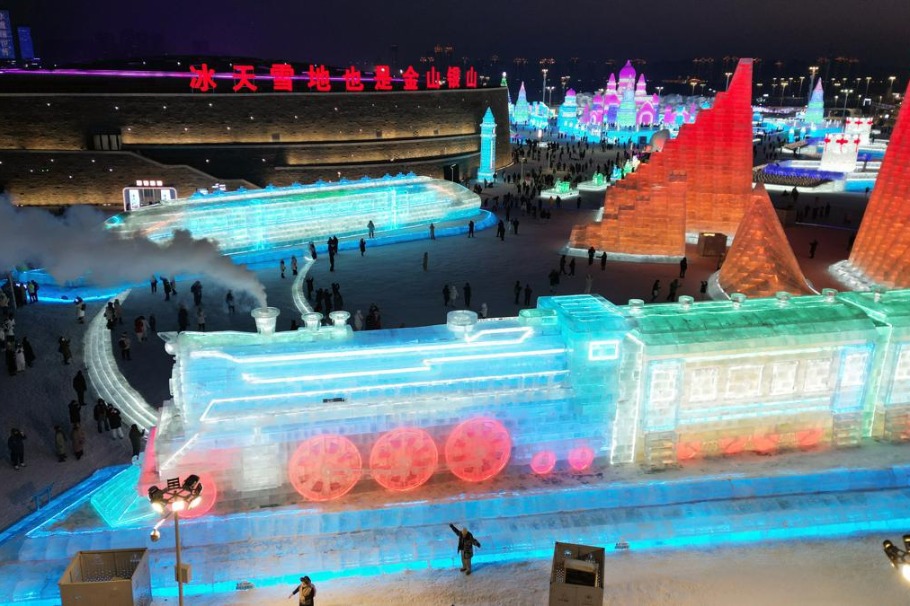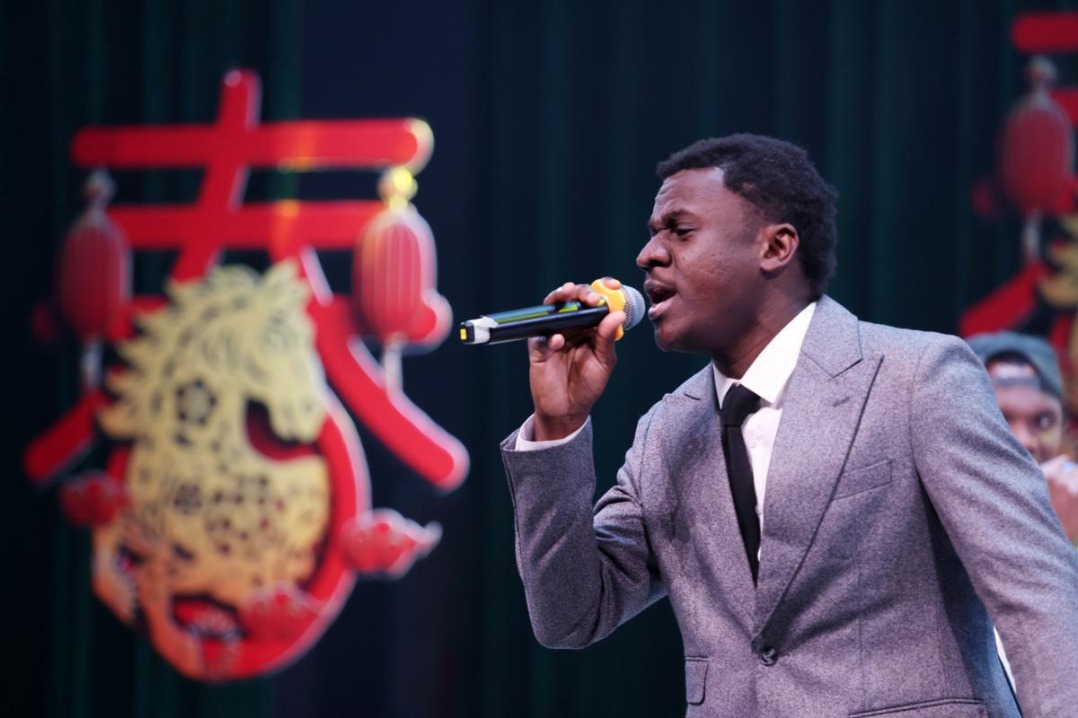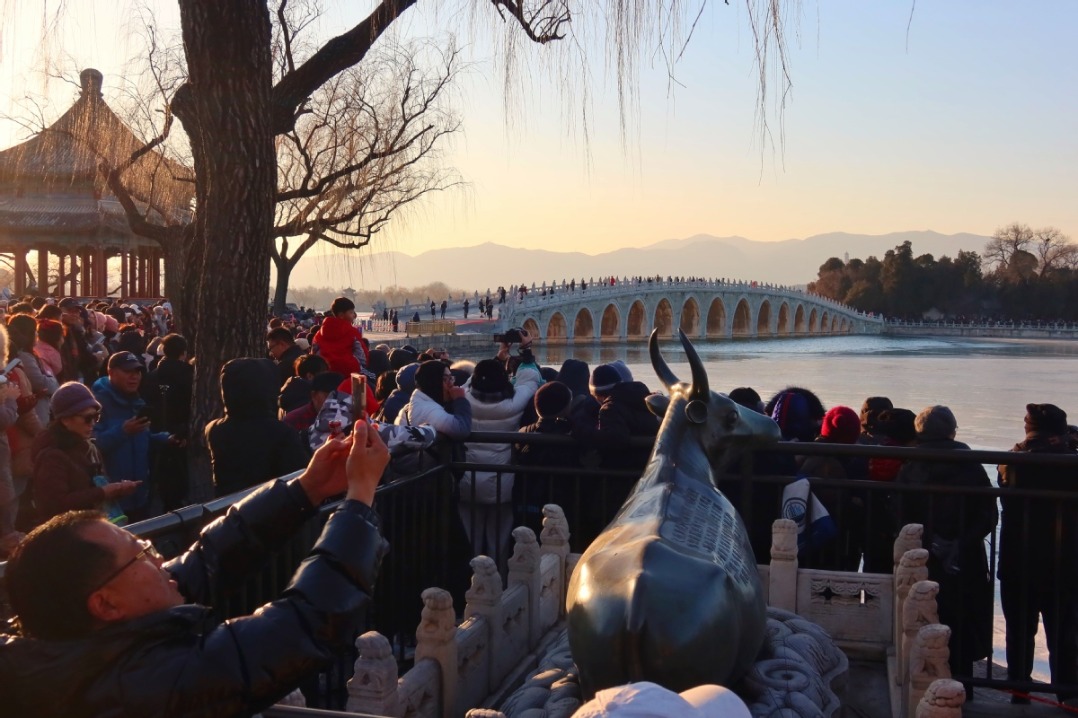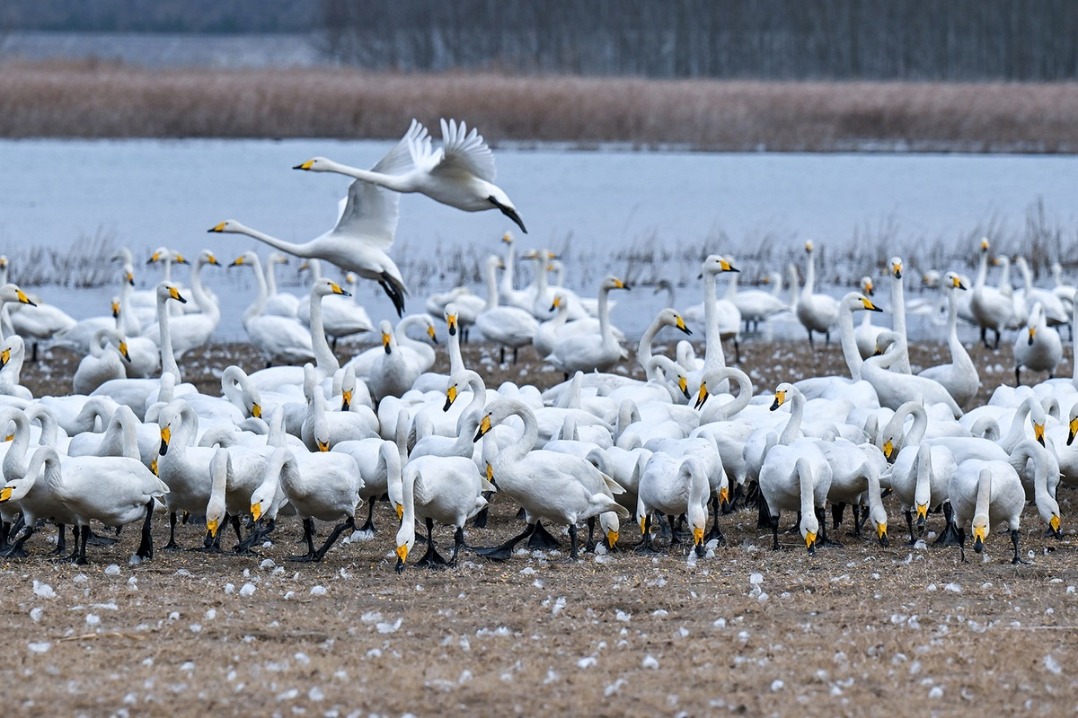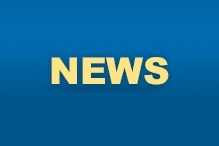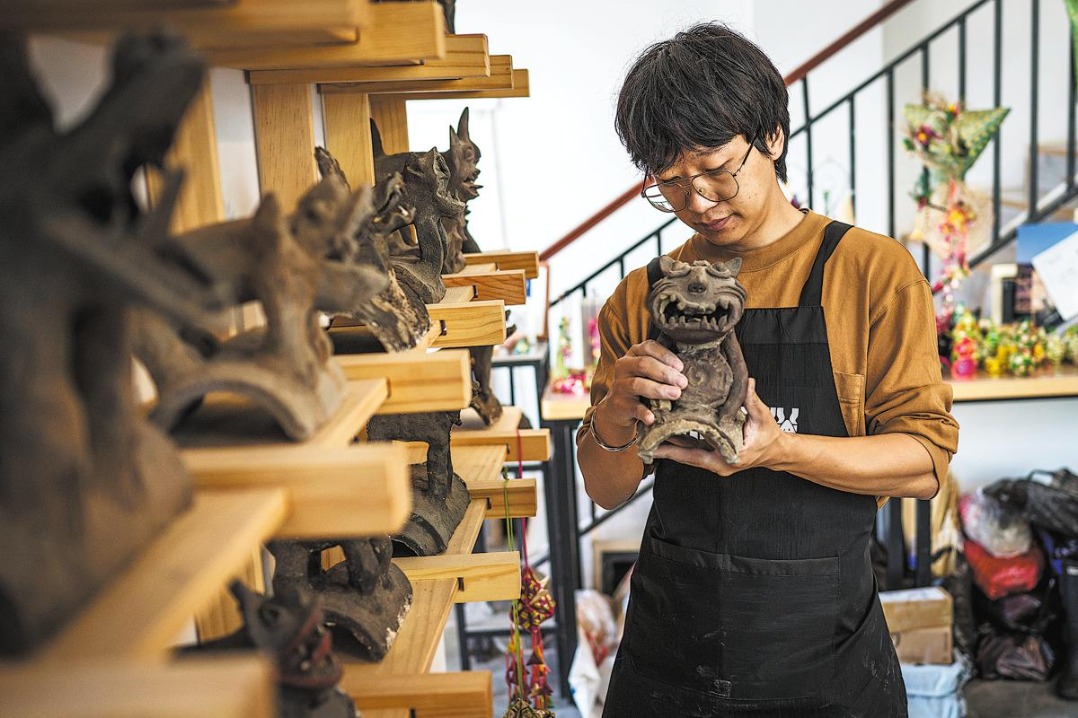Who do US politicians really stand with? -- Truth about US blatant interference in China's internal affairs on Hong Kong-related issues (part 2)

PART 7
In June, Smith said in an interview that the imposition of the national security law in Hong Kong had created an "atmosphere of coercion" that threatens both the city's freedoms and its standing as an international business hub.
The disturbance in Hong Kong following the proposed ordinance amendments in June 2019 dealt a heavy blow to Hong Kong's economy and people's livelihood.
In 2019, Hong Kong's economy posted the first negative growth in 10 years. Official data showed that around half of service industries recorded year-on-year decreases in business revenues, as accommodation services and retail industries dropped 14.3 percent and 11.1 percent respectively, with tourist visits to Hong Kong slumping, and unemployment in retails, hospitality and catering sectors staying high.
Since the national security law in Hong Kong took effect by the end of June 2020, the society has returned to the right track and residents have lived in peace, opening up a new situation in Hong Kong where order replaces chaos.
In the first quarter of 2021, the city's number of crimes dropped about 10 percent year-on-year, while gross domestic product (GDP) saw a 7.9 percent year-on-year increase.
In June, the International Monetary Fund released a report that reaffirmed Hong Kong's position as an international financial center.
According to the World Investment Report 2021 released by the United Nations Conference on Trade and Development, Hong Kong remained the world's third largest destination for foreign direct investment in 2020.
The national security law in Hong Kong only targets four types of offences, namely, secession, subversion, terrorist activities and collusion with a foreign country or with external elements to endanger national security. It is designed to deter and punish a handful of criminals seriously jeopardizing national security, and to protect the overwhelming majority of law-abiding Hong Kong people.
All efforts and law enforcement relating to safeguarding national security will be conducted in strict accordance with legal provisions, mandates and procedures. The legislation will not affect the rights and freedoms, including those of speech, of the press, of publication and of assembly that Hong Kong residents enjoy under the law. It will enable them to better exercise their lawful rights and freedoms in a secure environment.
The legislation, since taking effect, has better ensured the city's high degree of autonomy in accordance with law, and created conditions for resolving deep-rooted problems concerning Hong Kong's economy and people's livelihood. It also contributes to Hong Kong's rule-of-law and business environment, addresses the concerns in the business communities on social turbulences, and creates better conditions for people around the world who are willing to work, invest and live in Hong Kong.
Washington, while chanting the slogan of "stand with Hong Kong people," has in fact engaged in actions against the national security law in Hong Kong and imposing the so-called "sanctions." Such self-contradictory behaviour exposed its hypocrisy and despicableness.
PART 8
On June 25, the White House put out on its website a statement regarding the closing down of Hong Kong's Apple Daily, in which it falsely accused China of suppressing press freedom.
The Apple Daily, under the cloak of a media outlet, had long engaged in illegal acts of harming the country and destabilizing Hong Kong, seriously violating the journalistic ethics and jeopardizing the media environment of Hong Kong.
The newspaper had long been engaged in concocting fake news to mislead the public. During the turbulence over proposed ordinance amendments in Hong Kong in 2019, the newspaper produced a flurry of fake news and peddled wrong values to perplex the public, disseminate "anti-police" and "anti-China" remarks, and instigate "Black Violence."
Hong Kong is a society governed by rule of law and everyone is equal before the law. No one has extra-legal privileges, and no institution is an extra-legal entity. Hong Kong police act against individuals and companies suspected of endangering national security in strict accordance with the law, and their actions are a just move to crack down on crimes and maintain the rule of law and social order.
Those who describe moves on an individual news organization and on those in charge of an individual news organization as acts to crack down on press freedom have ulterior motives and are seeking to talk black into white.
It is the United States which has brutally suppressed the media and restricted press freedom. Analyses by The Guardian and Netherlands-based investigative journalism website Bellingcat showed from May 26, 2020 to June 2, 2020 alone, there were 148 arrests or attacks on journalists covering protests ignited by the killing of George Floyd, among which 34 instances involved officers physically assaulting journalists, and 33 instances involved journalists being arrested or detained. A female photojournalist was left blinded in the left eye by a police projectile during one of the protests. In 2021, the US government forcibly shut down more than 30 foreign news media websites.
German writer Michael Lueders has revealed in his new book "The Hypocritical Superpower" that the US government and its interest groups are apt at influencing and shaping public opinion by selecting information and polarizing public views, so that people are brainwashed without any realization. Washington's repeated provocations in this respect reveal that it is in fact a mastermind of troubles and a public opinion manipulator.
In fact, the press freedom in Hong Kong has not been damaged, but has been consolidated. At present, there are 93 local, 69 overseas and 39 online media organizations registered with the government, respectively, showing increases from a year ago. The press and the general public exercise the right of supervision every day and enjoy the freedom to criticize the administration of the HKSAR government. There is no obstruction for overseas media to interview people with different positions.
PART 9
On July 7, the White House announced the extension of the so-called "national emergency with respect to Hong Kong" and of relevant Hong Kong-related sanctions for one year, and continued with the cancellation of preferential treatment for Hong Kong.
The so-called "national emergency with respect to Hong Kong," a measure announced by former US President Donald Trump's administration on July 14, 2020, is a gross interference in China's internal affairs. The extension of the so-called "national emergency" also marked the first time that Joe Biden, since taking office as US president, continued with Trump's thinking on Hong Kong from the perspective of policy implementation, and once again publicly intervened in Hong Kong affairs, which are China's internal affairs. Such an act seriously undermined China's sovereignty, security and development interests.
Hong Kong had always been an excuse for Washington to put pressure on Beijing during the Trump administration. At the end of June 2020, the Law on Safeguarding National Security in HKSAR was promulgated and implemented. Trump then signed an executive order, declaring that the United States immediately entered a "national emergency" on the grounds that the situation in Hong Kong would pose a "threat" to the national security, economy and foreign policy of the United States. At the same time, the country also ended its special treatment for Hong Kong. Previously, Hong Kong enjoyed treatment that many cities in the Chinese mainland did not have, mainly in immigration, import and export control, tourism and economy.
The Biden administration followed the Trump administration's wrong acts on Hong Kong, extending the so-called "national emergency," and continued with its outrageous sanctions against China.
Sanctions on Hong Kong, however, will surely backfire and bite the United States. Official data released by China last year showed that there were around 85,000 US citizens and more than 1,300 US enterprises in Hong Kong, including almost all of America's major financial firms. Over the years, the United States has gained a huge trade surplus from its trade with Hong Kong, and its interests in Hong Kong have been deep and direct. Sanctions will bring "complexities" to US enterprises in Hong Kong, subjecting their normal operations to political risks.
In as early as 2020, there was wide condemnation around the world against the so-called "sanctions" imposed on Hong Kong by countries such as the United States. Chester Humphrey, president of the Senate of Grenada, pointed out that the United States just wanted to divert the attention of the American people from domestic problems, and that its "sanctions" against other countries were illegal. Patricio Giusto, director of the Sino-Argentine Observatory, said that the so-called "sanctions" will not pose a substantial threat and have no legal basis, which once again exposed the "double standards" of US politicians.
"Standing with Hong Kong" on one hand and relentlessly sticking to sanctioning it on the other is the absurd logic of US politicians and a logic that no one, including Hong Kong people, can understand.
PART 10
On July 10, the US Department of State posted a statement issued by 21 members of the so-called "Media Freedom Coalition" on its website, expressing "strong concerns" about the judicial organs of the HKSAR handling the case of Apple Daily according to law, and falsely claiming that "the use of the National Security Law to suppress journalism is a serious and negative step."
Freedom is not laissez-faire. Scientific rationality, legal order and international rules are the foundation of freedom. As Montesquieu said in The Spirit of Law, "liberty is the right to do what the law permits." Any freedom has boundaries. Even the so-called "free countries" have also defined clear forbidden zones and restrictions for freedom, and it is never allowed to break through the bottom line of the legal system. "The most stringent protection of free speech would not protect a man in falsely shouting fire in a theater and causing a panic," said US Justice Oliver Wendell Holmes in a judgement in 1919.
Constitutions of over 100 countries in the world stipulate that the exercise of basic rights and freedoms must not endanger national security. The International Covenant on Civil and Political Rights clarifies that the rights to freedom of belief, expression, peaceful assembly and public trial must be subject to necessary restrictions on grounds of national security, public order, public health or morals or the rights and freedoms of others. The European Convention on Human Rights has similar provisions. The United States, Britain, Canada, Australia and other countries have also established strict legal systems to safeguard national security, and have no mercy in cracking down on criminal acts endangering national security.
In the United States, although the First Amendment to the Constitution stipulates that freedom of speech and press should be ensured, the country still set up state agencies that conduct oversight over on the media. The Federal Communications Commission is responsible for issuing licenses to radio and television stations in the United States and imposes basic restrictions on program content. The US Supreme Court has also said that speech that "directed to inciting imminent lawless action and is likely to produce such action" is not protected.
In Germany, denial of the Holocaust and other forms of incitement to hatred against certain ethnic groups are punishable by up to five years in prison. In August 2018, the German Federal Constitutional Court said in a ruling that punishing the denial of Nazi genocide is fundamentally in line with the constitutional provisions on freedom of speech. In France, the current Law on the Freedom of the Press clearly stipulates that damaging the basic interests of the country, abetting crimes, slandering and insulting, and spreading false news through the media are all illegal and criminal acts, and must be punished. Penalties include fines, imprisonment, and confiscation of publications.
Hong Kong police arrested and prosecuted Apple Daily and its personnel and froze related properties for colluding with external forces and jeopardizing national security. These actions are a necessary and legitimate move to safeguard the rule of law in Hong Kong, and has nothing to do with protecting freedom of speech and the press. The United States gathered some members of the so-called "Media Freedom Coalition" to beautify and excuse the anti-China and destabilizing Hong Kong media outlets and their employees in an attempt to put pressure on China. Its actions seriously desecrated the spirit of law and seriously violated the conscience of the media.
Apple Daily is also a mirror, which not only reflects the ending of the anti-China and destabilizing Hong Kong forces, but also clearly reflects the "double standards" of the US side in dealing with the Hong Kong issue. We would like to ask, are Hong Kong people willing to stand with such politicians and governments?
PART 11
On July 16, as a bid to smear Hong Kong's business environment, the US government issued a so-called "business advisory" to caution US businesses about "emerging risks" to their operations and activities in Hong Kong. Meanwhile, Washington imposed sanctions on seven officials of the Liaison Office of the Central People's Government in the HKSAR.
The US advisory, which attempts to discredit the national security law in Hong Kong while stating that Hong Kong is still a popular investment and trade location for the United States and that it provides competitive financial, trade and professional services, is self-contradictory and illogical.
Investors' moves are an important indicator of Hong Kong's business environment. More than a year after the implementation of the national security law, the initial public offering funds raised in Hong Kong exceeded HK$500 billion ($64.35 billion), representing an increase of more than 50 percent year-on-year. Total deposits in Hong Kong banks rose by over 5 percent from a year ago.
The American Chamber of Commerce in Hong Kong said that the city has a crucial role to play as an international business hub, and that it "remains a critical and vibrant facilitator of trade and financial flow between the East and West." Jim Thompson, chairman and founder of logistics company Crown Worldwide Group, said the US administration is making it "harder for American investors to do business in the city, which is like putting handcuffs on them ... This is so sad."
Experts and scholars believe that the so-called "business advisory" from the US government will not affect corporate decisions -- while the United States regularly issues similar warnings, businesses make their own judgements. The enterprises did not withdraw from Hong Kong even when black-clad rioters were running wild in the city, and they are less likely to do so now as Hong Kong's social order has been restored and the city's development has been back on track under the protection of the national security law.
The stepped-up sanctions by the United States have already backfired and bitten the country itself. US trade surplus with Hong Kong totaled $297 billion from 2009 to 2018. When the sanctions were imposed, US trade and finance were the first to take a hit.
In a Foreign Affairs article published mid-July, former US Consul General in Hong Kong Kurt W. Tong wrote that the US Treasury Department knows "sanctions on major Chinese banks could trigger significant instability in the international payment system, by interrupting the huge volume of financial transactions between the world's two largest economies," which would "in turn harm US financial markets and the perceived reliability of the US-centric global payments system."
When even the American people are unwilling to stand with their own government, the lie of US politicians that they "stand with the people of Hong Kong" naturally falls apart.
CONCLUSION
US politicians have been constantly claiming to defend Hong Kong's human rights and freedom and "stand with the people of Hong Kong." But actions speak louder than words. All their slogans have proved to be nothing but lies.
All Chinese people including people in Hong Kong have already clearly seen what these politicians are defending is not the Hong Kong people's human rights and freedom, but the "freedom" of a handful of rioters to disrupt Hong Kong's stability and endanger China's national security, and the "freedom" of these politicians to continue interfering in Hong Kong's affairs and containing China.
Under the pretext of democracy and human rights, these politicians have been offering real endorsements for the rioters, which fully exposes the double standards of these US politicians. They condemned the Jan 6 Capital riot with utmost rage, but nevertheless called similar acts in Hong Kong "a beautiful sight to behold." They have enacted the world's most thorough national security law at home, but nevertheless tried to smear China's parallel efforts to plug the security hole in Hong Kong.
In the name of "press freedom," they are interfering with and undermining the rule of law in Hong Kong. Amid the closure of Apple Daily, those US politicians fully exposed their tricks to smear others. They tried to turn some media organizations into extra-legal entities for anti-China forces to disrupt Hong Kong and contain China. By making waves on Hong Kong issues, the US side has revealed itself as the "black hand" in stirring up opposition and controlling public opinion. The so-called "press freedom" is nothing but a fig leaf for their self interests.
They twisted facts, deliberately smeared the rule of law in Hong Kong and grossly interfered in China's internal affairs. "Patriots administering Hong Kong" is the trend of the times and the aspiration of the Hong Kong people. Improving Hong Kong's electoral system is necessary for the sustained and healthy development of Hong Kong's democratic system. When peace and stability were finally restored in Hong Kong, and the rights and freedoms of Hong Kong citizens were better protected in a secure environment, the United States leveled accusations and attacked Hong Kong's efforts to improve its electoral system, and continued to demonize the national security law in Hong Kong, which fully exposes Washington's hegemonic nature.
While habitually bullying others and wielding the big stick of sanctions, those US politicians have in fact exhausted their tactics. For them, only a chaotic Hong Kong serves their interests. The more stable Hong Kong is, the more anxious they will be. And now, their "agents" were arrested. Their plans for disturbing the city have failed. No matter how much pressure or how many rounds of sanctions the United States can impose, they will be nothing but waste paper.
All in all, some US politicians' concern about Hong Kong's democracy is a sham. Their true intention is to meddle in Hong Kong's politics and China's internal affairs. Their real purpose is to use Hong Kong as a tool to realize their political interests and contain China's development. The so-called "standing with the Hong Kong people" is nothing but a cover to deceive the world and reflects the hypocrisy of the US politicians. What they are doing is to make enemies with the Hong Kong people. Those politicians are advised to stop repeating these cliches.
In 1840, Britain opened the door of China with ships and guns, and Hong Kong was gradually occupied by Britain. For more than 100 years since then, the Chinese people have waged indomitable struggles for national liberation, national independence and social progress. Today, the Chinese nation has made a great leap from standing up, getting prosperous to becoming strong, and their effort to realize the great rejuvenation of the Chinese nation has entered an irreversible historical process. China has become an important force in safeguarding world peace and promoting common development, and its relations with the rest of the world have undergone tremendous changes.
With the implementation of a series of effective measures, including the national security law, Hong Kong's social order has been restored, its development has returned to the right track, and the city has opened a new chapter with good governance. Hong Kong is getting more stable and prosperous with a better implementation of the "one country, two systems" principle. This is the strongest response to those US politicians who slander Beijing's Hong Kong policy.
No one can stop Hong Kong from reclaiming its glorious past. The Chinese people will never allow any foreign force to bully, oppress or enslave them, and the cause of "one country, two systems" will never be obstructed or undermined by any external force. Anyone who would attempt to do so will find themselves on a collision course with a great wall of steel forged by over 1.4 billion Chinese people. History has proved countless times that the final victory will always belong to the indomitable Chinese people.
- Xi presents orders to promote two military officers to rank of general
- New penalties planned for violations related to radioactive waste management
- Best practices in youth cultural exchange released at Chongqing conference
- Yearender: China's 2025 space endeavors have seen new milestones
- HR conference sparks discussion on talent potentials in AI era
- Exhibition of entries for 6th China animal specimen competition opens in Shanghai

















